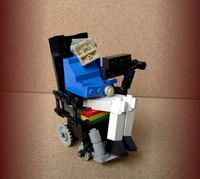- Posts: 672
- Thank you received: 51
Identifying depression
- Able_Here_Team
-
 Topic Author
Topic Author
- Offline
- Moderator
-

Less
More
15 years 10 months ago #29729
by Able_Here_Team
Identifying depression was created by Able_Here_Team
Dr Luisa Dillner's guide to . . . Identifying depression
Despite 15% of us being affected by depression, it still carries a stigma
Psychiatrists used to warn that depression was under-diagnosed. However, more recently some have argued that it is over-diagnosed. In 2007, in the British Medical Journal, Professor Gordon Parker, an Australian psychiatrist, wrote that \"normal\" sadness was being classified as depression. Since depression can severely affect your ability to enjoy life, or even drag yourself out of bed, it's worth knowing if you have it.
What is depression?
It is a medical condition, a debilitatingly low mood which people describe as a cloud hanging over them. It affects 15% of people, so most of us know someone who has suffered from it. Surveys often show that despite it being common, many people still think it is a sign of weakness.
Who is at risk?
The risk is higher than average if you have a physical illness, such as heart disease, and depression can run in families. Drinking too much alcohol can also make you depressed.
What are the main symptoms?
There is quite a long list, many contradictory such as insomnia and sleepiness, weight loss and weight gain and restlessness and loss of energy. Feelings of worthlessness, feeling low most of the day, loss of concentration and a preoccupation with death are also recognised symptoms. These are not occasional, but are persistent and preoccupying symptoms. People with severe depression will have most of the symptoms.
How can you tell if you are depressed?
There are clear criteria for diagnosing depression, such as those in the Diagnostic and Statistical Manual of Mental Disorder. There is also the Patient Health Questionnaire (PHQ-9) - but you should go through this with your doctor. Or you could try the NHS Direct test. A study by the University of Auckland found two questions in particular screened for depression rather well. These were: \"during the past month, have you often been bothered by feeling down, depressed or hopeless?\" and \"during the past month, have you often been bothered by little interest or pleasure in doing things?\" But subsequent studies suggest otherwise. However, if you also answer yes to a third question, \"Is this something you would like help with?\" you are more likely to have depression.
Should I see a doctor?
Yes, if you answer yes to any of the above questions. If you feel suicidal, seek help straight away.
What else could it be?
In older people depression can be confused with dementia or other mental health problems. If you are grieving for someone, the depressive symptoms you feel may be due to bereavement, rather than an ongoing mental illness. If they don't get better you should seek help.
Despite 15% of us being affected by depression, it still carries a stigma
Psychiatrists used to warn that depression was under-diagnosed. However, more recently some have argued that it is over-diagnosed. In 2007, in the British Medical Journal, Professor Gordon Parker, an Australian psychiatrist, wrote that \"normal\" sadness was being classified as depression. Since depression can severely affect your ability to enjoy life, or even drag yourself out of bed, it's worth knowing if you have it.
What is depression?
It is a medical condition, a debilitatingly low mood which people describe as a cloud hanging over them. It affects 15% of people, so most of us know someone who has suffered from it. Surveys often show that despite it being common, many people still think it is a sign of weakness.
Who is at risk?
The risk is higher than average if you have a physical illness, such as heart disease, and depression can run in families. Drinking too much alcohol can also make you depressed.
What are the main symptoms?
There is quite a long list, many contradictory such as insomnia and sleepiness, weight loss and weight gain and restlessness and loss of energy. Feelings of worthlessness, feeling low most of the day, loss of concentration and a preoccupation with death are also recognised symptoms. These are not occasional, but are persistent and preoccupying symptoms. People with severe depression will have most of the symptoms.
How can you tell if you are depressed?
There are clear criteria for diagnosing depression, such as those in the Diagnostic and Statistical Manual of Mental Disorder. There is also the Patient Health Questionnaire (PHQ-9) - but you should go through this with your doctor. Or you could try the NHS Direct test. A study by the University of Auckland found two questions in particular screened for depression rather well. These were: \"during the past month, have you often been bothered by feeling down, depressed or hopeless?\" and \"during the past month, have you often been bothered by little interest or pleasure in doing things?\" But subsequent studies suggest otherwise. However, if you also answer yes to a third question, \"Is this something you would like help with?\" you are more likely to have depression.
Should I see a doctor?
Yes, if you answer yes to any of the above questions. If you feel suicidal, seek help straight away.
What else could it be?
In older people depression can be confused with dementia or other mental health problems. If you are grieving for someone, the depressive symptoms you feel may be due to bereavement, rather than an ongoing mental illness. If they don't get better you should seek help.
Please Log in or Create an account to join the conversation.
Moderators: Scott_1984
Time to create page: 0.203 seconds
